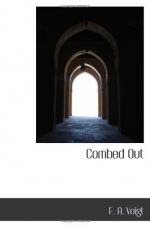All the smaller tables were occupied, but there was one long table that stretched across the room and only a few men were sitting at the far end of it. The officers sat down at the near end and ordered coffee. They seemed a little embarrassed at first, but they soon began to talk freely to each other:
“I wonder if there’s a war on in these parts—I hear the Huns have made a bit of a push.”
“Curse the blighters—they’ll mess up my leave, it’s due in a week’s time.”
“Jolly good coffee, this! Here, Marie, bring us another two cups—der coop der caffay—that’s right, isn’t it?”
“Dat’s right,” said the girl, “you speak goot French—vous avez tout a fait l’accent parisien.”
Suddenly her sister came running into the room, sobbing loudly:
“English soldier come round from Commandant—he tell us Shermans come—ve got to go ’vay at once, ve got to leave everysing—ve go ’vay and English troops steal everysing and shellss come and smash everysing and ve looss everysing.”
The civilians of the village had received orders to leave immediately. Through the window we could see groups of people standing in the street and talking together. They were greatly agitated.
The old woman sniffed and wiped her eyes. The elder daughter was packing a few things in a bundle. One of the officers asked: “What about our coffee?” but she took no notice. Her sister had gone out in search of further information.
She soon returned. Yes, they would all have to leave at once, but, if they liked to take the risk, they could come back to-morrow with a wagon, if they could get one, and fetch their belongings.
They were comforted. They knew where they would be able to get a wagon. They would cart their stock and their household property away on the morrow. They would start another estaminet somewhere. They would suffer loss and inconvenience, but they would not be ruined—their valuable stock of wines would save them from that.
The bundle was made up and they prepared to leave. We paid our bill and went out into the street. Numbers of soldiers were straggling past. They looked wretched and exhausted. Their boots and puttees were caked with mud. They had neither rifles nor packs. Three men were lying up against a garden wall. We asked them for news. They could not tell us much, except that the Germans were still advancing.
“We was at Dickebusch when ‘e started slingin’ stuff over—gorblimy, ’e don’t ‘alf wallop yer—umpteen of our mates got bleed’n’ well biffed. We cleared out afore it got too ’ot.”
Several famished “battle-stragglers” had entered our camp in order to beg for food. They sat round the cook-house and ate in gloomy silence.
In the adjoining field a number of tents had sprung up. Blue figures were moving in and out amongst them. The French had arrived.




